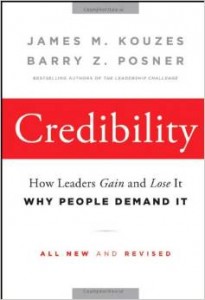 Credibility is one of those intangibles in life that can change dramatically from moment to moment. Throughout your life – and your career – you will have many opportunities to compromise your credibility. Never compromise your credibility. The credibility that you enjoy today has taken years to build. Why risk throwing it all away? Protect your credibility. It is one of your greatest assets. Your credibility is built on the foundation of your personal and professional character, and your competence as a professional.
Credibility is one of those intangibles in life that can change dramatically from moment to moment. Throughout your life – and your career – you will have many opportunities to compromise your credibility. Never compromise your credibility. The credibility that you enjoy today has taken years to build. Why risk throwing it all away? Protect your credibility. It is one of your greatest assets. Your credibility is built on the foundation of your personal and professional character, and your competence as a professional.
In their seminal book, Credibility: How Leaders Gain and Lose It, Why People Demand It, authors James Kouzes and Barry Posner in their longitudinal research on leaders asked professionals how they felt when they were in the presence of truly great leaders. The top ten replies were: Capable. Challenged. Enthusiastic. Inspired. Motivated. Powerful. Proud. Repeated. Supported. Valued.
How do you communicate with credibility? These tips will help you to consistently position yourself as a professional.
Align verbal and nonverbal language. Listen to your words and intonation. Be aware of your nonverbal language.
Lead by listening. Practice active listening. Deliver an “SOS” to your brain – Silently Observe, Then Speak.
Make realistic promises and keep them. Think before you speak. Do what you say you will do.
Speak from the heart. Create a mindset of inclusion. Use compassionate, caring language.
Be yourself. Align your values and behavior. Don’t try to mimic someone else’s behavior. Be your most authentic self.
Be an expert. Enhance your knowledge base continuously. Be a resource. Share your knowledge with others.
Be honest. Frame what you’re sharing so it benefits the other person. Know the difference between using kid gloves (being gentle) and boxing gloves (being more assertive).
Be proactive. Ask people their preferred form of communication. Ask clarifying questions to gain understanding. Seek challenging assignments at work, then follow through to get the job done.
Be consistent. Don’t flip-flop. Don’t exhibit unpredictable behavior.
To gain – and maintain – your credibility requires a great deal of behind the scenes strategic thinking. Begin with a simple self-assessment. It’s worth the time and your constant attention.


